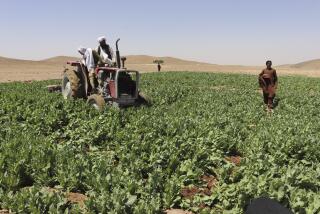Reputed Narcotics Figures in Parliament : Pakistan: Anti-drug drive dealt a blow by election of notorious suspects. U.S. threatens to cut off economic and military aid.
- Share via
ISLAMABAD, Pakistan — An alleged drug baron and two men suspected of opium dealing are members of the new Parliament, creating speculation that Pakistan’s already sluggish anti-drug campaign may founder.
Officials say about 30 tons of heroin are shipped from Pakistan every year. Domestic and foreign narcotics officers have criticized successive governments for failing to stop the trade.
“They have not been able to successfully prosecute and imprison what you would call a major” drug figure, a narcotics agent said, on condition of anonymity.
The United States, frustrated by the lack of action, has threatened to cut off more than $500 million in economic and military aid that already has been frozen because of suspicion that Pakistan is developing nuclear weapons.
Ayub Khan Afridi, said to be one of Pakistan’s main drug traffickers, won a National Assembly seat in the Oct. 24 elections. At least two other successful candidates are suspected of large-scale involvement in the opium trade.
A diplomat said, on condition of anonymity: “We’ve told them, ‘You have a handful in the National Assembly that everyone recognizes are ear-deep in the heroin trade. It’s only going to get worse.’
“It’s the National Assembly that passes the laws, and if criminals are influencing how the law is written, you can pass some pretty ineffective laws.”
In 1983, Afridi was convicted in absentia and sentenced to one year in jail after failing to show up in court to answer charges of drug trafficking. Records also show at least five outstanding arrest warrants on similar charges.
Several anti-drug agencies in Pakistan and abroad have sought Afridi’s arrest without success. Afridi dismisses the allegations as a baseless slander campaign conducted by former Prime Minister Benazir Bhutto during her 20 months in power.
“That’s rubbish,” said Zahid Sarfraz, interior minister in the caretaker government that replaced Bhutto when she was dismissed in August. Sarfraz, who was in charge of narcotics control, said the drug charges against Afridi have nothing to do with politics.
Prime Minister Nawaz Sharif’s new government created a Narcotics Ministry and put Rana Chandar Singh in charge.
Analysts doubt that Singh, a Hindu, will be able to penetrate the orthodox Muslim tribal country where the drug trade is based. The diplomat said: “Perhaps that’s why he got the job.”
Drug raids and arrests are made periodically, and some are impressive.
Narcotics agents confiscated more than 3,800 pounds of heroin with an estimated street value of $130 million an 800 tons of hashish, chemicals used for making heroin and a cache of semiautomatic rifles and missile launchers.
At least one person charged after the raid is a member of the Baluchistan provincial assembly and of the province’s governing party.
Such raids are highly publicized, but Pakistani and foreign narcotics officials say only small-time operators and couriers go to jail.
The tribal area, where opium and heroin are produced, is a lawless strip of rough terrain along the border with Afghanistan where Pakistani authorities have little authority.
As one narcotics agent described it: “The tribal area is a sanctuary where they can operate virtually with impunity.”
Sarfraz, the former interior minister, found one of the outstanding arrest warrants for Afridi shortly before turning the ministry over to his successor, but could not order the arrest after he left office.
In an interview, he said of Afridi: “Is he bigger than the government of Pakistan? Either we let the name of the government of Pakistan be dragged through the mud or we arrest him.”
More to Read
Sign up for Essential California
The most important California stories and recommendations in your inbox every morning.
You may occasionally receive promotional content from the Los Angeles Times.











